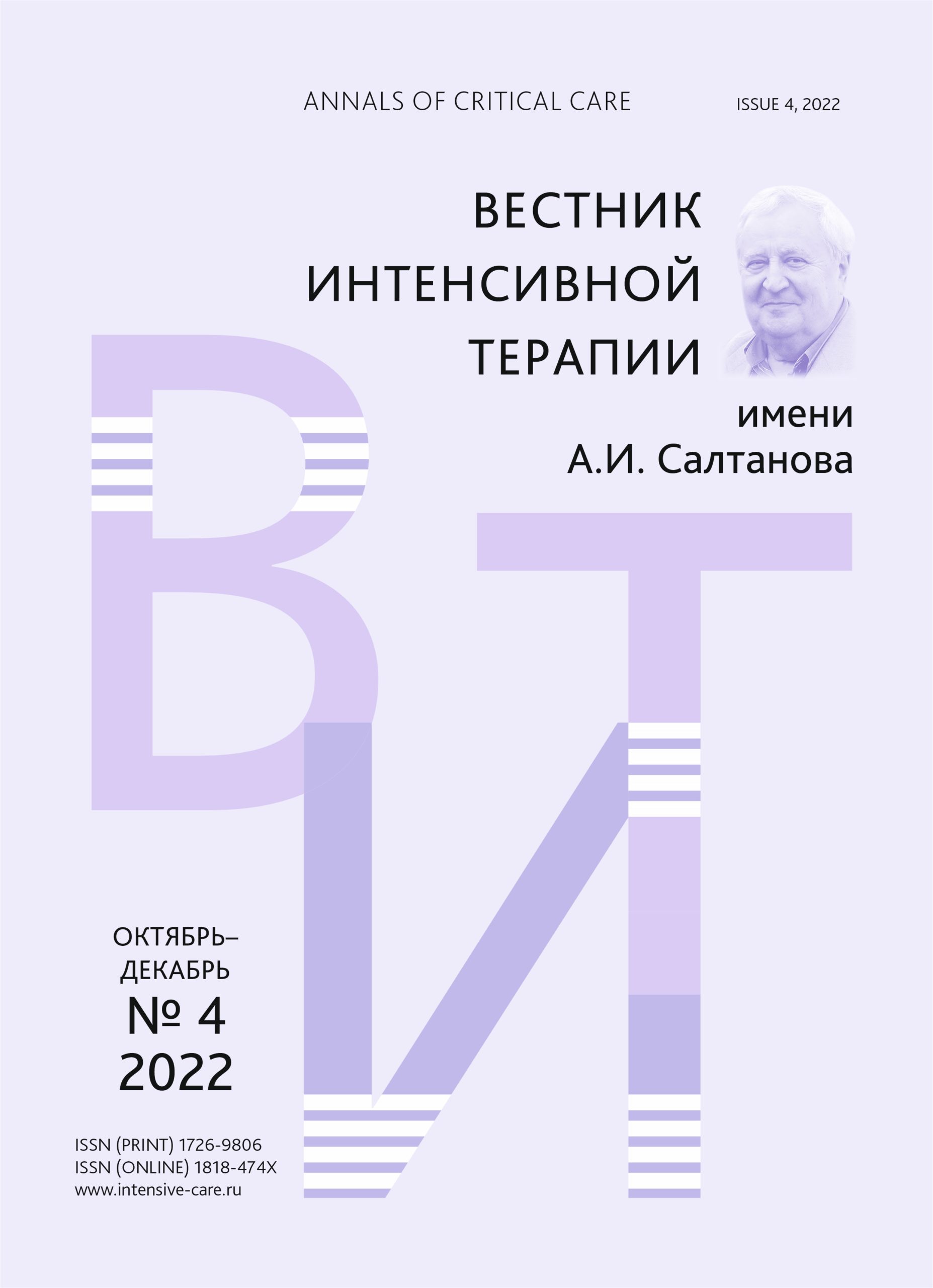Аннотация
АКТУАЛЬНОСТЬ: Медицинский персонал (медперсонал) часто ограничивает присутствие родителей с их детьми в отделении реанимации и интенсивной терапии (ОРИТ), мотивируя это тем, что родители могут привносить серьезные затруднения в работу отделения, создавать дополнительную психоэмоциональную нагрузку на персонал и пациентов. ЦЕЛЬ ИССЛЕДОВАНИЯ: Оценить социальные и психоэмоциональные аспекты совместного пребывания членов семьи (родителей) с пациентом (ребенком) в ОРИТ с позиции работающего в них медперсонала. МАТЕРИАЛЫ И МЕТОДЫ: В исследование были включены лечебные учреждения России 2-го и 3-го уровней, которые следовали принципам и идеологии семейно-ориентированного подхода в лечении пациентов (медиана и квартили — 4,00 [2,00–10,00]). Сбор сведений осуществлялся на основании анкет — 417 шт. Полученные данные были подвергнуты дескриптивному анализу. РЕЗУЛЬТАТЫ: Респонденты оценивали условия труда и уровень своей заработной платы в более чем 30 % ответов не выше удовлетворительного. В спектре оказываемой членами семьи помощи пациенту в ОРИТ медперсонал указал соответственно: 89 и 91,5 % — санитарно-гигиенический уход, 82 и 81,9 % — кормление пациента, 32 и 47,1 % — помощь медперсоналу в транспортировке и перемещении пациента. Уровень подготовки родителей к уходу за пациентом на этапе поступления его в ОРИТ составил: по оценке врачей — 3 (2–3), а при переводе пациента из ОРИТ — 4 (3–4), по оценке медсестер — 3 (2–3) и 3 (3–4) соответственно. Претензии, по мнению медперсонала, к оказываемой медицинской помощи со стороны пациентов и членов их семьи чаще были обусловлены недооценкой ими сложности ситуации с пациентом (врачи — 58 %, медсестры — 48,6 %), характерологическими особенностями пациентов (33 и 36,3 %) и их родителей (48 и 39,8 %), недостаточной осведомленностью о состоянии здоровья пациента (медсестры — 23,2 %). ВЫВОДЫ: Совместное пребывание родителей с детьми в ОРИТ не привносит значимых психоэмоциональных и трудовых нагрузок в профессиональной деятельности медперсонала и создает положительные условия для повышения уровня знаний и умений родителей в уходе за своими детьми.
Библиографические ссылки
- Twibell R., Siela D., Riwitis C., Neal A., Waters N. A qualitative study of factors in nurses and physicians decision-making related to family presence during resuscitation. Clin. Nurs. 2017; 27: 320–34. DOI: 10.1111/jocn.13948
- Coats H., Bourget E., Starks H., et al. Nurses’ Reflections on Benefits and Challenges of Implementing Family-Centered Care in Pediatric Intensive Care Units. Am J Crit. Care. 2018; 27: 52–8. DOI:10.4037/ajcc2018353
- Ekman I., Swedberg K., Taft C., et al. Person-centered care — Ready for prime time. Eur. J. Cardiovasc. Nurs. 2011; 10: 248–51. DOI: 10.1016/j.ejcnurse.2011.06.008
- UN Convention on the Rights of the Child. 1990. Available online: https://www.regeringen.se/49b764/contentassets/8caaeabf4 9834f16aa52df2108837b2d/fns-konvention-om-barnets-rattigheter-so-199020 (accessed on January 15, 2021).
- Fullbrook P., Latour J., Albarran J., et al. The presence of family members during cardiopulmonary resuscitation: European federation of critical care nursing associations, European society of paediatric and neonatal intensive care and European society of cardiology council on cardiovascular nursing and allied professions joint position statement. Eur. J. Cardiovasc. Nurs. 2007; 6: 255–8. DOI: 10.1016/j.ejcnurse.2007.07.003
- Dudley N., Ackerman A., Brown M.K., Snow K.S. Patient- and Family Centred Care of Children in the Emergency Department. Off. J.Am. Acad. Pediatr. 2015; 135: e255–e272. DOI: 10.1542/peds.2014-3424
- Maxton F. Parental presence during resuscitation in the PICU: The parents’ experience. J. Clin. Nurs. 2008; 17: 3168–76. DOI: 10.1111/j.1365-2702.2008.02525.x
- American Academy of Pediatrics. Patient- and Family-centered Care and the Pediatrician’s Role. Off. J. Am. Acad. Pediatr. 2012; 129: 394–404. DOI: 10.1542/peds.2011-3084
- The National Board of Health and Welfare. Support for Patients and Parents’ Support. 2019. Available online: https://www. socialstyrelsen.se/utveckla-verksamhet/jamlik-halsa-vard-och-omsorg/stod-till-anhoriga/ (accessed on 16 January 2021).
- Coyne I., Hallström I., Söderbäck Reframing the focus from a family-centred to a child-centred care approach for children’s healthcare. J. Child Health Care. 2016; 20: 494–502. DOI: 10.1177/1367493516642744
- Dahav P., Sjöström-Strand A. Parents’ experiences of their child being admitted to a paediatric intensive care unit: A qualitative study-like being in another world. Scand. J. Caring Sci. 2018; 32: 363–70. DOI: 10.1111/scs.12470
- Hung M.S.Y., Pang S.M.C. Family presence preference when patients are receiving resuscitation in an accident and emergency department. J. Adv. Nurs. 2011; 67: 56–67. DOI: 10.1111/j.1365-2648.2010.05441.x
- Meert K.L., Clark J., Eggly S. Family-Centered Care in the Pediatric Intensive Care Unit. Pediatr. Clin. N. Am. 2013; 60: 761–72. DOI: 10.1016/j.pcl.2013.02.011
- Al Mutair A. Should Family be Allowed during Resuscitation. Resusc. Asp. 2017; 4: 45–51. DOI: 10.5772/intechopen.70189
- Ellison S. Nurses’ Attitudes Toward Family Presence during Resuscitative Efforts and Invasive Procedures. JEN J. Emerg. Nurs. 2003; 29: 515–94. DOI: 10.1016/j.jen.2003.10.001
- Waldemar A., Thylén I. Healthcare professionals’ experiences and attitudes towards family-witnessed resuscitation: A crosssectional study. Int. Emerg. Nurs. 2019; 42: 36–43. DOI: 10.1016/j.ienj.2018.05.009
- Mattson J., Forsner M., Castrén M., Arman M. Caring for children in pediatric intensive care units: An observation study focusing on nurses’ concerns. Nurs. Ethics. 2013; 20: 528–38. DOI: 10.1177/0969733012466000
- Актуальные вопросы методологии «Открытая реанимация» (совместное пребывание ребенка с родителями в отделениях реанимации и интенсивной терапии): Методические рекомендации / Под ред. В.В. Лазарева, Н.Н. Савва, К.А. Вартановой. М.: Проспект, 2018. [Topical issues of the methodology of “Open resuscitation» (joint stay of a child with parents in intensive care units and intensive care units): Methodological recommendations / Edited by Lazarev V.V., Savva N.N., Vartanova K.A. Moscow: Prospect, 2018. (In Russ)]

Это произведение доступно по лицензии Creative Commons «Attribution-NonCommercial-ShareAlike» («Атрибуция — Некоммерческое использование — На тех же условиях») 4.0 Всемирная.
Copyright (c) 2022 ВЕСТНИК ИНТЕНСИВНОЙ ТЕРАПИИ имени А.И. САЛТАНОВА

